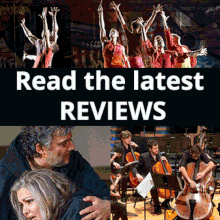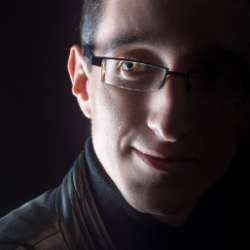We’re in a café a stone’s throw from the Seine, close to the Gare de Lyon. Hat glued to head, pushing a trolley case, Josephine Stephenson has just come off her train from Avignon, where she has been composer-in-residence since last season. Once a pupil of the Maîtrise de Radio France choir school, Stephenson departed to England for a decade, during which time she completed her higher education and started her professional career. Now she is back in France. For how long? She shrugs.
The young thirty-something is definitely someone to watch in the world of classical music – but not only classical music. It’s a rare artist indeed who can compose an opera, have her music open the Présences contemporary music festival alongside music by Steve Reich, hit a divine high C in a YouTube video seen by millions, write songs and arrangements for famous pop artists and record for them on cello, guitar or voice.
You can’t describe Stephenson (who has recently adopted the moniker Juneson for her pop projects) as leading a double life: it’s really a triple life, a quadruple life, the nine lives of a cat together behind large, clear, impenetrable eyes.
Where to begin? Perhaps in Avignon, where her first large-scale opera, Three Lunar Seas, will premiere at the start of May. The genre has frightened off plenty of other composers, but Stephenson welcomed the challenge. “Obviously, it’s a bit intimidating because it’s a big project which involves a lot of people, so the composer ends up with a lot of responsibility. But in life, the frightening things are precisely the ones to go for”, she tells me. “As it happens, I’m a singer, so I like writing for voices. I love collaborating with other artists, and opera is the definitive place in which to do that. So it’s great!”
Stephenson is somewhat less intimidated because she has already written two smaller operas, easing the progression to works on a larger scale. Les Constellations – Une Théorie was premiered in 2017 in Dunkirk by new opera specialists Miroirs Étendus; and Narcisse, commissioned by company Arcal Lyrique, was premiered in 2019.
One has to look further back in time to find her operatic origins. “When I was still a Master’s student, I got the chance a write a mini-opera, twenty minutes or so: On False Perspective. It was magic! It was also my first chance to work with Ben Osborn, who is now the librettist of Three Lunar Seas. After that first project we promised to each other that we would do a full-scale opera together.
When Frédéric Roels, the director of Avignon Grand Opera, offered this residency and commissioned an opera from me, I was blown away!” Stephenson continues. “I love Ben’s writing – it’s beautiful, poetic, without ego, of great purity, filled with images. When I read what he writes it speaks to me immediately. We have a working relationship that’s really special, we get on so well. He understands that because he’s writing the text before I add the music, there may need to be changes and cuts. So the libretto is in a shared document online: when he has written something, I can add comments, ask for a different word here or there, let him know if a given passage is too long, or needs some additional text. We’ve really worked together to achieve the best result, the best possible marriage of music and words, with great confidence in each other, which is a precious thing.”
Stephenson attaches great importance to her collaborators – she is far from the cliché of the walled-in composer deaf to all around them. “With the three stories which make up Three Lunar Seas, I imagined three different types of music and characters, whose casting we organised very quickly. That made me able to take into account each singer’s tessitura, the character of their voice. I’m not interested in writing in an abstract manner, to write extremely high notes just because it’s a soprano. I prefer to know who the singer is, what’s going to work for them vocally – that allows me to imagine how the music I write is going to sound, and is a great source of inspiration.”
It also allows her to overcome writer’s block, which could easily crop up with such a large project. “With Narcisse, I had so many constraints that I had to hunt around for possibilities. With Three Lunar Seas, it was almost the polar opposite: there were so many possibilities that I had to impose some constraints on myself.” Hence the idea of taking the theme of the moon – the theme of Opéra Grand Avignon’s current season — and drawing on its myths and legends. Weaving them together into three stories allows the composer to express her multiple personalities: “One of the singers will be Kate Huggett, a singer I know from my work outside classical music.”
There’s the rub. Between France and England, torn between the classical and pop worlds, Stephenson is unclassifiable. It all started in France, when her teachers at the conservatoire and the Maîtrise de Radio France served up the cocktail that she still returns to today. “Toni Ramon, who was the director of the Maîtrise during my first two years there, gave this mixture of passion and seriousness. He considered it crucial, particularly with new music, to respect the text and the composer, to work hard to get a satisfying result.”
The Maîtrise is where her vocation as a composer originated: “There was a composition competition. I went in for it, won and my little three minute a capella piece was sung by the Maîtrise at the Auditorium de Radio France, with Toni Ramon conducting. It was magical! I’d already composed before, mainly songs, but that was just for me, nothing serious. Seeing something that started in my head show up on stage, with forty singers in front of an audience, really gave me butterflies.”
It wasn’t until her university education in England that the young composer began to find her form. “I don’t think I would have been happy at the Paris Conservatoire. Throughout my schooling in France, I was constantly confronted with this mania for putting things into boxes: I wasn’t allowed to take a composition course before having a diploma in tonal composition; not permitted to play Brahms cello sonatas before learning all the technical concertos. It made me sad.” She continued composing alone in her room, but nothing left those four walls.
Arriving in England was “a breath of fresh air: I felt far more welcome, appreciated, understood. I was playing cello in an orchestra, singing in a choir, I had a folk group – the energy was insane! Students were putting on Shakespeare plays on their own, getting original music written by their friends. It was both ambitious and open-spirited.”
Arriving at crossroads, Stephenson chose simply to take all paths forward at the same time. In parallel with composing, she worked with the top choirs in the country, most notably Tenebrae, which made her famous across the world for her high C in Allegri’s Miserere. She laughs about it: “If only people who saw the YouTube video knew the circumstances! I wasn’t supposed to be there that day, I came by bike, there was a misunderstanding, I managed to free up half an hour in the end, someone lent me a dress...”
Despite this success, she hasn’t wanted to specialise in singing or, indeed, in anything else. “When I spend too much time in choirs, I start thinking about composing. When I’m with composers, I want to get up on stage. I think I just hate being put into a box.”
Still, the soprano and composer has tended to abandon her first loves, the songs played on guitar in her bedroom. When the Covid-19 pandemic arrived, lockdown acted like a summons to return to something small-scale. “I tried to get back to my roots, to my first creative impulses. And I realised that I was missing horribly the process of writing songs and singing them. I’d been procrastinating for fifteen years, telling myself every year that ‘next summer, I’m going to do an album’”. So it was time.
After writing arrangements or doing backing vocals for various singer-songwriters, she was invited by Laura Cahen to co-compose for a new project – this caused the rebirth of a buried part of her personality. “When I sing songs like the one with Laura, I have a voice that’s pretty different from the one in the Allegri Miserere.”
For that reason, it was necessary to create Juneson: “I chose the name to consciously separate things, so that when I’m doing a project as Juneson, I leave behind all my baggage as Josephine Stephenson, all my studies, to come back to my slightly naive state of being an adolescent writing songs after learning guitar all on my own. Now, when I pick up a guitar, I sometimes decide to change the tuning to remove points of reference, to let myself be surprised by what can happen when I improvise. Instead of moving from head to paper, the music comes from my body into my head. More than musical genre, it’s really those processes that I’ve wanted to distinguish when taking on the name Juneson.”
The aim now is to finally write this album that’s been sitting there for fifteen years. “I just want to take the time to put together a few pieces, an EP to start with. I’ve got a few fragments to work on. Then, maybe a gig – but that’s scary!” She bursts into vaguely embarrassed laughter. Scarier than a first big opera? She nods. “In an opera, there’s a division of responsibilities. But in a project where I’m writing and singing, there’s nowhere to hide.”
She runs through her upcoming events, including her invitation for next September to the Musique(s) Rive Gauche festival in Paris, with a new work for the ensemble I Giardini and a project with French artist Laura Cahen and Evergreen. Now that sounds like someone returning happily to the crossroads. “So we'll get to see Juneson and Josephine Stephenson in the same festival”, she tells me with a smile.
Josephine Stephenson’s Three Lunar Seas is at Avignon Grand Opera on 5th and 7th May. Translated from French by David Karlin




